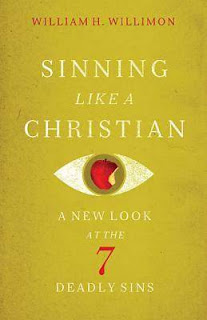What I've Been Reading - January
Sinning Like a Christian: A New Look at the 7 Deadly Sins , William Willimon. In preparation for Lent, where we will be preaching through the historic seven cardinal sins, I've been reading several books on the topic. This is by far the best, and is really the spine of my discussion. Willimon explores these sins in a way that is at points disjointed - the chapters feel more like meandering reflections than systematic studies - but consistently insightful and provocative. I found myself deeply challenged as I worked through the book, recognizing patterns and shadows in my own heart that I often overlook.
, William Willimon. In preparation for Lent, where we will be preaching through the historic seven cardinal sins, I've been reading several books on the topic. This is by far the best, and is really the spine of my discussion. Willimon explores these sins in a way that is at points disjointed - the chapters feel more like meandering reflections than systematic studies - but consistently insightful and provocative. I found myself deeply challenged as I worked through the book, recognizing patterns and shadows in my own heart that I often overlook.
Perhaps the greatest asset of the book is Willimon's ability to name these sins as normal and even a bit ridiculous while also helping us see the destructiveness of them. He particularly focuses on Christ as our example, reflecting on how evils which seem commonplace in our world are shown in stark contrast to the self-giving love of our Savior.
The book's strength, however, rests not in these critiques but in the succinct and clear explanations of why the church has historically held these views. While none of it was new information, walking through the arguments again was incredibly helpful. Even more, once I dug past the dense writing and mind-bending ideas, it was worshipful. God is not like us in fundamental ways. That is the reality that some modern revisionists are trying to avoid. Yet it is also a part of what it means to truly honor Him as God. When we are brought to the place where words have been wrung dry and reason has been exhausted and we know that, while what we've said is true, it is but the outermost edges of a Truth beyond our comprehension or explanation - that is a place that calls us to praise.
Red Famine: Stalin's War on Ukraine
This is a very good book, although a heavy read both in terms of content (it is almost 500 dense pages) and subject matter (there is a long stretch discussing the widespread cannibalism that resulted from the mass starvation that is especially disturbing.) That said, it stands as a striking testament to both the evils of the Soviet Union specifically and to the hubris of intellectuals willing to sacrifice everything for the "greater good" more generally. Indeed, one of the things that struck me throughout was the utilitarian nature of so much of the thinking. Once the communist future was seen as an ultimate good and moral checks on power removed, it seemed to matter little how many millions of bodies were piled up as a foundation for that good. A warning to all of us that, when we start to accept that the ends justify the means, we can quickly end up excusing terrible evils.


